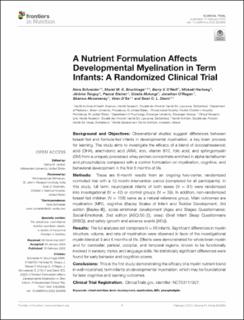| dc.identifier.citation | Schneider, N., Bruchhage, M. M., O'Neill, B. V., Hartweg, M., Tanguy, J., Steiner, P., ... & Deoni, S. C. (2022). A nutrient formulation affects developmental myelination in term infants: a randomized clinical trial. Frontiers in Nutrition, 9, 21. | en_US |
| dc.description.abstract | Background and Objectives: Observational studies suggest differences between breast-fed and formula-fed infants in developmental myelination, a key brain process for learning. The study aims to investigate the efficacy of a blend of docosahexaenoic acid (DHA), arachidonic acid (ARA), iron, vitamin B12, folic acid, and sphingomyelin (SM) from a uniquely processed whey protein concentrate enriched in alpha-lactalbumin and phospholipids compared with a control formulation on myelination, cognitive, and behavioral development in the first 6 months of life.
Methods: These are 6-month results from an ongoing two-center, randomized controlled trial with a 12-month intervention period (completed for all participants). In this study, full term, neurotypical infants of both sexes (N = 81) were randomized into investigational (N = 42) or control groups (N = 39). In addition, non-randomized breast-fed children (N = 108) serve as a natural reference group. Main outcomes are myelination (MRI), cognitive (Bayley Scales of Infant and Toddler Development, 3rd edition [Bayley-III]), social-emotional development (Ages and Stages Questionnaires: Social-Emotional, 2nd edition [ASQ:SE-2]), sleep (Brief Infant Sleep Questionnaire [BISQ]), and safety (growth and adverse events [AEs]).
Results: The full analyses set comprises N = 66 infants. Significant differences in myelin structure, volume, and rate of myelination were observed in favor of the investigational myelin blend at 3 and 6 months of life. Effects were demonstrated for whole brain myelin and for cerebellar, parietal, occipital, and temporal regions, known to be functionally involved in sensory, motor, and language skills. No statistically significant differences were found for early behavior and cognition scores.
Conclusions: This is the first study demonstrating the efficacy of a myelin nutrient blend in well-nourished, term infants on developmental myelination, which may be foundational for later cognitive and learning outcomes. | en_US |

